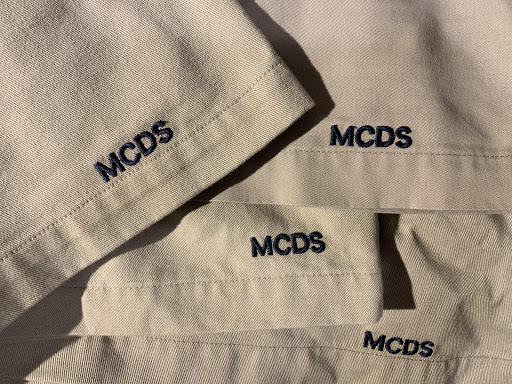Skort Lengths – One Student’s Opinion

Photograph by G Bruce
Does the hemline of a “skort” really detract from scholarly pursuits?
I’ll begin with the fact that I respect most rules.
Shorts and skorts at MCDS “cannot be too form-fitting” and “must be fingertip length or longer.” On the surface, this rule seems to be sensible. The basic reason behind such a rule is that the faculty and administration simply don’t want Upper School girls walking around in short skorts. That seems understandable, right? But why don’t they want this? To answer that question, turn to page 24 of the 2019-2020 Upper School Parent-Student Handbook. The first sentence of the “Dress Code” section states that the reason behind these rules is to “maintain standards of dress and appearance appropriate to the seriousness of academic pursuits.” Now, for a second question: what qualifies as something appropriate to serious academic pursuits and why don’t short skorts fit these qualifications? According to these rules, the female body has no place in the school environment because its form does not maintain certain standards of “seriousness.”
I’ve seen it in the halls- girls frantically pulling down their skorts when they reach the door of notoriously strict faculty, warning their friends on days when uniform citations are being written up at unusually high rates. Of late, short-skort-length-induced uniform citations to girls have appeared to become prevalent, with some girls receiving multiple citations since the beginning of this school year only one month ago.
This is how it usually plays out: a member of the faculty or administration points her out in a crowd. She is sent to the Dean’s office and reprimanded. Then, she is finally allowed to continue with her day after having her own learning interrupted, when what she is wearing is supposed to be the alleged disruptor of learning. She doesn’t think much about the reason behind the rule she has broken. It’s time we start thinking about the reason. The Upper School Handbook does not explicitly state why it is that form-fitting and short skorts detract from the seriousness of the academic pursuits here at MCDS. Would we, as Upper School girls, appear to be more serious about our academic pursuits if we wore Risse Brother’s trousers rather than skorts? This apparently proves to be true.
Telling girls that the length of their skorts can detract from the “seriousness” of an environment is an outdated concept, a result of the puritanical foundation this country was built on by our forefathers- the same forefathers who did not consider women in our Constitution. How can we achieve total respect and equality when we are still tethered and limited in our ability by traditionalism and conservatism? It would not be outlandish to claim that by telling young girls that their skorts detract from the “seriousness” of an environment, we are promoting rape culture. Rape culture in no way means that our society promotes rape. It does, however, cultivate the toleration and justification of sexual violence and the practice of blaming the victim. Rape culture normalizes and defends the taking advantage of the female sexuality, or the sexuality of any gender for that matter, due to sociological beliefs made surrounding gender and what “should” be. If you’ve ever heard the phrase, “she was asking for it,” that’s rape culture, and these rules indirectly submit to that concept. If you’ve ever heard someone ask, “what was she wearing?” upon hearing that a girl was raped, that’s rape culture. Since they are young, girls are taught that their bodies are distracting. Their bodies are sources of arousal that must be hidden. Their bodies are disrespectful and distasteful. Their bodies are offensive. In order to be taken seriously, girls must dress modestly. So, we are told not to wear short skirts. That’s the way it’s been and the way it is now, but that’s not the way it has to be. Our character is not measured by the length of our skirt. Skorts of a long length do not indicate prudishness and skorts of a short length do not indicate suggestiveness. They do not indicate anything. They are pieces of fabric, yet obviously so much more.
These rules instill in the minds of young girls the preconceived notion that they are preyed on. That may seem shocking to some, but it’s the truth. These rules make us feel dirty. They make us feel like we’re doing something wrong by being female and that we shouldn’t embrace ourselves. These rules cultivate systematic sexism in our society. We are spoon-fed these rules until they become hardwired into our brains: don’t walk alone at night, don’t leave your drinks unattended, don’t smile too much or you’ll give the wrong impression, don’t keep a straight face too much or you’ll give the wrong impression. “You’re not seriously leaving the house dressed like that, are you?” To girls, harassment seems inevitable, so the only thing we can do is try to avoid it. Society doesn’t teach: “don’t harass!” Instead, it teaches: “don’t get harassed!”
But, like everything, dress code does have a limit. Women should be taught how to value their bodies and respect themselves, rather than be taught to be ashamed of their bodies and hide. I can’t define the universal line between short and too short or tight and too tight for all women, so we must define these lines for ourselves. We know our bodies the best.
So, to this I say: let us be the judges of our own skorts. Let us be the masters of our own bodies.
Our OpEd Policy: Letters to the editor and guest commentaries may be published in excerpts or full at the discretion of the editorial staff. The views, thoughts and opinions expressed in letters, excerpts and guest columns are the writer’s alone and do not necessarily reflect those of any other party, including the opinions or policies of the staff. The editors review all submissions including letters to the editors, advertising, guest commentaries and reserve the right to edit, publish and refuse material. Reasons for refusal can include length, clarity, libel, obscenity, and/or material disruption of the educational process at Miami Country Day School.

Giulianna Bruce is a senior at MCDS and she’s so excited to be this year's Editor-in-Chief of The Spartacus! Giulianna joined three years ago with the...











Carolyn Dorn • Sep 24, 2019 at 12:06 pm
I couldn’t agree with you more as you know. It will be most interesting if your argument brings about change in the dress code. Hope it does. Your prose is superb; your argument sound.
Akbar Rizvi • Sep 23, 2019 at 6:07 pm
Superb. Thanks for educating us, Giulianna.
Morgan Dent • Sep 23, 2019 at 12:02 pm
This is so awesome!!! Proud of you 🙂
Carla • Sep 23, 2019 at 11:37 am
Good Job Giulianna , Im glad this is something we can all discuss. I know many girls that feel that same way or even can find themselves into the arguments that you stated. You had a lot of courage to write about that, and it something that many girls are questioning themselves about.
Thank You for sharing this with all of us !
Really good argument.
Sabrina Cabarcos • Sep 23, 2019 at 11:26 am
This is awesome! I’m excited to find out if this article will inform future dress code policy.
Samuel E Brown • Sep 23, 2019 at 8:47 am
Well-argued, Giulianna (that final concession really sealed the deal). I have seen at least one young man targeted for shorts that didn’t pass the fingertip test, but the burden of this rule does seem to fall disproportionately on young women. Our society has a way of thinking of men’s clothing as “unmarked,” in the parlance of linguist Deborah Tannen — meaning normative and neutral, while women’s clothing is marked by their gender. In fact, young women have been taught that such gendered differentiation of clothing was their duty — as my aunt was in her schooldays, when she was suspended for wearing pants to high school in the early 60s. It is ironic that after the struggles of previous generations of young women to enjoy equality in schools that hemlines have returned as a source of controversy. While we can and should work with Risse brothers to ensure students have options that they are comfortable with AND comply with the school’s norms, the gendered history of clothing and the diversity of thought in our community are such that it is hard to imagine that skorts can void controversy for long. The skort itself is a hybrid reminder of the compromises we have already made about these issues.
Mark Joseph Runge • Sep 23, 2019 at 8:28 am
You make many valid points. This is an important issue that, as a school, we need to talk about, and it has been at the three schools where I’ve taught. I hope that your poignant words instigate more dialogue and resolution to this issue, especially for the girls who are called out of their learning environment for a rule I am not sure I now understand.
I wonder how many students are willing to invest time in researching and addressing the issue in a manner that will engage the administration and lead to meaningful change we can all embrace.
I for one will seek answers to the questions you’ve caused me to think about.
Thank you for your important words!
Karen Davis • Sep 23, 2019 at 6:57 am
With 955 views in only 24 hours, this has become the article with the most views in the least amount of time. Clearly the sentiments revealed and the arguments made hit the target for something that matters to our community, from both students and faculty. Kudos to Giulianna for a well crafted OpEd piece. One faculty member wrote to me that we ought to keep in mind that rules addressing dress code are not just gender specific. That’s a good point too. I’d like to hear more about that from others.
ARLET LARA • Sep 22, 2019 at 9:51 pm
I am very proud of you Giulianna!
Peter Konen • Sep 22, 2019 at 6:46 pm
Excellent.
Jim Connor • Sep 22, 2019 at 6:07 pm
Very well written and closely argued! Well done, Giulianna. If you are not on a debate team, you should be. I found your editorial thought-provoking to the point of my finding myself questioning old assumptions.
Giulianna Bruce • Sep 22, 2019 at 3:05 pm
I’m so grateful that I go to a school where we can freely discuss important issues like these and publish articles like mine.